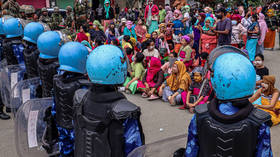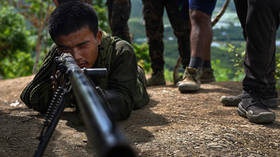Women-led bench to oversee probes into violence in India’s northeast

In an attempt to restore faith in the rule of law in Manipur, an Indian state marred by ethnic violence since May, India’s apex court bench, headed by Chief Justice of India (CJI) Dhananjaya Yeshwant Chandrachud, has constituted a committee of three retired high court women judges.
The panel, as declared by the Supreme Court, will address humanitarian concerns related to the violence in the northeastern state, aiming to “restore a sense of faith in the rule of law and build a sense of confidence.”
The all-female panel will delve into a range of issues, including relief efforts, remedial measures, rehabilitation initiatives, and the restoration of homes and places of worship in the state.
The panel will be headed by Justice Gita Mittal, the former chief justice of Jammu & Kashmir High Court, Justice Shalini Joshi, the former judge of Bombay High Court, and Justice Asha Menon, the former judge of Delhi High Court.
The top court resumed the hearing of pleas related to the ongoing ethnic clashes in Manipur on Monday. Last week, the court lashed out at the Narendra Modi-led federal government for a complete breakdown of law and order and constitutional machinery in Manipur.
It also made a scathing remark against the Manipur Police for a “tardy” and “lethargic” probe of incidents of ethnic violence, especially those targeting women. The CJI-led bench asked Manipur’s Director General of Police to be present during the hearing to respond to queries on the violence and the steps taken by the administration to restore normalcy.
The Supreme Court bench also asked for high-ranking police officials from different states of India to be deputed to the Central Bureau of Investigation (CBI), which was recently tasked with probing the cases of sexual assault in the state. The Supreme Court named Dattatray Padsalgikar, a former chief of Maharashtra Police, to head the probe to be conducted by the CBI. He will be assisted by five police officers, who will be drawn from other states, to conduct a fair and impartial investigation.
The Supreme Court ordered the all-female judicial panel and Padsalgikar to submit separate reports in the matter. It also outlined the jurisdictions of the probe into cases that have not been transferred to the CBI. Data shows that 42 special investigation teams were looking into these cases. The Supreme Court ordered a senior police official of the rank of deputy inspector general, who belongs to any state other than Manipur, to monitor at least six teams.
Earlier, the CBI had taken over a probe sparked by a viral video, in which two women were paraded naked by a mob, and one was gang-raped, in two districts of Manipur. The incident, which occurred on May 4 but did not draw public attention until July 20, when the video emerged on social media, caused an uproar in the monsoon session of parliament. So far, over 6,500 First Information Reports have been filed since the ethnic clashes between the majority Meitei and minority Kuki tribe were first reported on May 3.
The heinous crimes also triggered a wave of nationwide anger and sparked a fierce political debate, with the opposition parties moving a no-confidence motion against the government, to be debated in the parliament from Tuesday to Thursday, following the vote.
The violence erupted after the Kukis opposed Meitei demands to be granted Scheduled Tribes status, which would allow them to have reservations in government jobs, educational institutions, and other socio-economic benefits granted by India’s constitution. Over 160 people have lost their lives, including clashes over the weekend that led to six more deaths. Hundreds have been wounded and more than 60,000 – the majority of whom are Kukis – have been displaced following intermittent ethnic clashes.













